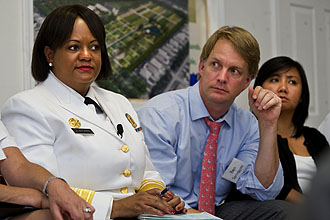Surgeon General Reaches Out on Oil Spill
Dr. Regina Benjamin, surgeon general of the U.S. Public Health Service and a Tulane alumna, visited New Orleans on Thursday (July 22) to conduct a meeting of community leaders on the effects of the Deepwater Horizon oil spill on public health, with a focus on issues related to mental health.

From left, Dr. Regina Benjamin, U.S. surgeon general; Dr. Ben Springgate of Tulane; and Diem Nguyen of the Mary Queen of Vietnam Community Development Corp. lead an animated discussion of how community organizations can respond to people under stress due to the oil catastrophe. (Photo by Paula Burch-Celentano)
The meeting was held at the Mary Queen of Vietnam Community Development Corp., which represents a New Orleans East community with many members who are dependent on fishing and shrimping. The event was part of the federal government's ongoing efforts with state and local officials to address the mental health impacts of the oil spill.
Speaking to a large audience, Benjamin talked about her ties to the Gulf Coast community, saying, “It's hard to talk about how much that water means. It's part of who we are.” A native of Daphne, Ala., who founded a clinic in Bayou La Batre, Ala., she acknowledged that “health stressors can impact health over time,” adding that she wanted to discuss the “resiliency and resources we have here.”
Benjamin was joined by Dr. Nicole Lurie, the U.S. Department of Health and Human Services' assistant secretary for preparedness and response; Dr. Jim Galloway, HHS health liaison to the National Incident Command; and Pam Hyde, leader of the Substance Abuse and Mental Health Services Administration.
Tulane University stepped in to organize the meeting at the request of federal officials. Taking up the task was Dr. Ben Springgate, executive director of community health innovation and research for the Tulane Office of Community Affairs and Health Policy. Tulane has partnered with RAND Health and REACH NOLA to provide mental health care in New Orleans after Hurricane Katrina.
Springgate said he was asked by HHS to work on the session “because of our program's track record in building and directing community partnerships for mental health and resilience that provided more than 110,000 mental-health services, worked with more than 80 nongovernmental organizations, and trained more than 400 local providers over the last few years.”
In addition to Springgate, Tulane participants included Dr. Charles Zeanah, professor and chair of child psychiatry; Dr. John Thompson, clinical professor of psychiatry and neurology; and mobile health providers from the Department of Medicine.
